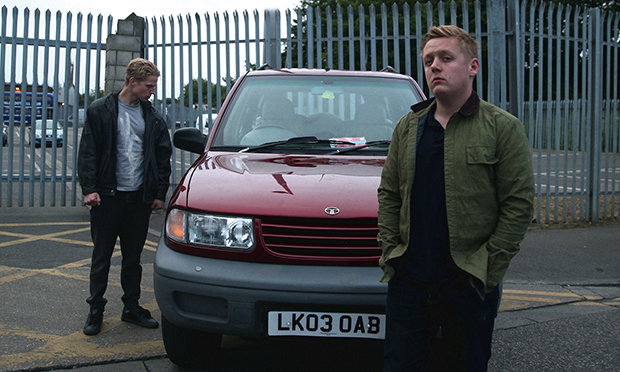
Jacked is a short by Dutch director Rene Pannevis which fits nicely into what one might call the grit-porn pantheon (his oeuvre also contains a film called Junkie XL and a documentary short of DJ Tiesto of all things).
It follows young car thieves Russell and Waylen, played by Charley Palmer Rothwell (Legend) and Thomas Turgoose (This is England) respectively, who find a stack of tapes made by a dying man addressed to his unborn daughter. Hilarity ensues.
It’s an interesting, thoughtful piece – if a little contrived – giving one enough to feel something of a stake in the lives of the two young protagonists, whilst capitalising on the brevity of the short form to retain a level of ambiguity. This is creditable considering the artistic treatment of such topics can all too easily err towards the proselytising, critical or, worst of all, glamourising.
The narrow, winding grey streets (it’s in colour, but barely) form a claustrophobic labyrinth in which our two protagonists work, with a short focus camera serving to isolate them from their background. It’s a well-worn technique, but in a story dealing with isolated yoof, the obvious reference is La Haine.
On speaking to Rothwell, he confirms Kassovitz’s 1995 work was in their minds whilst filming. He is more uncertain, however, about whether we can fairly call Jacked a film about East London, despite there being several clear signs that this is where the ‘action’ takes place.
“I think the director wanted to be ambiguous. I’m not too sure that the location needs to be relevant, it could be anywhere and it would still be as gritty,” he explains. It is indeed based, we are told, on the director’s own experiences in the Netherlands.
Why is it that we are so fascinated in an almost voyeuristic way by underclass life in film of late? “Because it’s real,” Rothwell says. “I’d not use the word underclass. Things like this aren’t as uncommon as people think. Very few people could relate to something like Riot Club. If it’s about things that are real, more people will watch. If you go north of London, it is very gritty, people are poor.”
Certainly, the question of the role and success of cinema (and of the arts in general) in addressing or mirroring an uneven society is an interesting one. It is unfair, perhaps, to narrow our discussion of this short to this question though, as it also touches on loss, friendship and loneliness, and can boast a minor triumph in the natural rapport between its two leads.
